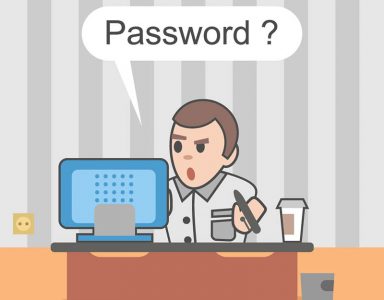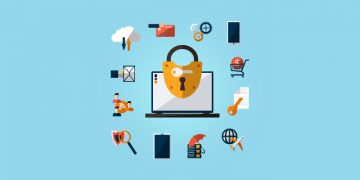7 Big Security Mistakes People Make Every Day

Even though the awareness of how to stay safe online is increasing, there are still some users who endanger their privacy every day without even realizing it. Unfortunately, most hackers are after any information they can get their hands on and so thinking you can be careless because cybercriminals will not be interested in your information or accounts is a huge mistake. For example, even your pet's name might appear to be useful if you use it as a password. If you never thought of this before we encourage you to read the rest of this blog post where we will list the seven most common security mistakes users make on a daily basis and explain how to avoid them.
Table of Contents
1. Choosing weak passwords
What is considered to be a weak password? If you search the Internet, you will most likely come across two specific examples: the word password itself and a particular combination of numbers (123456). Moreover, it could be any word that may describe the user or tell something about him and might be known publicly, for example, user's name or last name, date of birth, hometown, and so on. No doubt, using easily memorable combinations or words you know by heart makes it easier to log in. Sadly, such words make weak passwords as cybercriminals might not need to put much effort to guess them. Consequently, specialists encourage picking a complex password for best protection. Another thing we would suggest to ensure password security is using a password manager. This tool can safely store all users' passwords in an encrypted vault. For instance, Cyclonis Password Manager allows the user to choose between storing vault on his computer or a selected cloud storage solution.
2. Using the same password for all accounts
You picked a password from a couple of random words then added a few numbers or symbols and think you can use it for all your accounts? The truth is, you can do so; however, it is not recommendable. Using a complex password for best protection only works when each account has its own unique password. As you see, even though the password might be completely random and not something one could guess, it may still get compromised, for example, during a data breach. More than four million records are being stolen or lost every day according to Breachlevelindex.com, so clearly, data breaches occur every day, and it is entirely possible one of the web pages where you have an account could get hacked one day. In such case, your attempts to ensure password security might fail as hackers could try the combination they obtained during data breach and steal all the accounts that share the same password. Thus, it is necessary to think of a unique and complex password for best protection.
3. Picking easy security questions
One could say there are weak and strong security questions; same as it is with passwords. Thus, choosing questions like what is your mother's maiden name or what are your pet names could be a huge mistake. Many people share too much on social media these days without realizing they give away clues or in this case even straight answers to security questions. This is why before picking a security question it is crucial to consider if anyone else besides you could answer it by looking at your social media profile or content you post on it. If the answer is yes, you should move on to another question till you find you are the only one who could answer it. Provided, the answer is something you could never forget you should not have any trouble in case you need to use the security questions to recover a lost account.
4. Registering with the same email
Many social media websites suggest using email to log in faster. The problem is if you use one email account for all websites you may want to register on you may put them at risk. It would not matter if they all had complex and unique passwords. In some cases hacking the user's email might allow the cybercriminals to recover passwords linked to the stolen email account. Because of this, it might be safer to have a couple or a few different emails instead of always using the same one. The number of emails you may need depends on how many accounts you have and how important they are to you.
5. Turning off your smartphone’s lock screen
Another vital mistake could be not locking up your phone's screen. It is understandable, it might be irritating to have to unlock it if you use it often or all the time, but consider what could happen if you ever lose it or the device gets stolen? Without a lock on the screen, anyone who obtains the phone could access user's accounts and steal or misuse them. If the thought of possible consequences terrifies you, it would be wise to enable your screen's lock even though the chances of any of the mentioned situations happening might seem to be tiny. Some users turn off this feature because they are afraid they will forget their combination and will not be able to use the device themselves. Luckily, many mobile devices now have fingerprint scan option, which allows unlocking the phone by simply taping its scanner with your fingertip, so the unlocking process might appear to be much more fun than you may have imagined it.
6. Connecting to public Wi-Fi
Mobile data can be expensive and connecting to any available public Wi-Fi might look like a great way to reduce mobile Internet costs. The bad news is usually such connections are considered to be unsafe and not without reason. Wi-Fi connections that do not require any passwords and are available to anyone, can be accessed by anyone, including hackers. Therefore, in cases when you want to check your social media profile badly and have no mobile data we would recommend being extra cautious on public Wi-Fi networks, for example, you should avoid connecting to banking or any other sensitive accounts. In fact, to ensure password security, it would be best not to connect to any accounts at all. For more tips, continue reading this blog post.
7. Disabling the Two-Factor Authentication
Two-Factor Authentication (2FA) can increase password security and save your accounts from being hacked, for example, when hackers figure out your password. As you might be already aware, 2FA is an additional security layer that requires providing another factor besides the password to log in. For example, it could be the user's fingerprint or a secret code sent to his mobile device, selected email account, etc. When selecting 2FA with a code sent to the user's email, we would advise creating a new email specifically for it that would not be linked to any of your other accounts to lessen the chances of it being hacked.








